|
|
|
Sort Order |
|
|
|
Items / Page
|
|
|
|
|
|
|
| Srl | Item |
| 1 |
ID:
103440


|
|
|
|
|
| Publication |
2011.
|
| Summary/Abstract |
In 2009 the EU decided to reduce greenhouse gas emissions at least by 20% in 2020 compared to 1990 and to supply 20% of energy needs by 2020 from renewable energy sources. This paper uses an energy model coupled with a non-CO2 greenhouse gas model to assess the range of policy options that were debated to meet both targets. Policy options include trading of renewable targets, carbon trading in power plants and industry and the use of the Clean Development Mechanism to improve cost-efficiency. The models also examined fairness by analysing the distribution of emission reduction in the non-emission trading sector, the distribution of CO2 allowances in the emission trading sector and the reallocation of renewable targets across Member States. The overall costs of meeting both targets range from 0.4% to 0.6% of GDP in 2020 for the EU as a whole. The redistribution mechanisms employed significantly improve fairness compared to a cost-effective solution.
|
|
|
|
|
|
|
|
|
|
|
|
|
|
|
|
| 2 |
ID:
118240
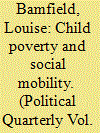

|
|
|
|
|
| Publication |
2012.
|
| Summary/Abstract |
Reviewing two of the latest reports by social mobility tsar, Alan Milburn and 'social justice' champion, Iain Duncan Smith, the article examines the politics and policy of the Coalition's fairness strategy and the jostling for position that is going on behind the scenes. Whilst continuing to pay lip service to the goal of ending child poverty, the government is seeking to redefine the problem, away from a narrow focus on relative low income. Beneath the rhetoric, the article highlights the close similarities between the 'new' and 'old' approaches, finding that the evidence behind the government's claims is unconvincing. Far from offering a 'step-change' in provision, it concludes that in the new age of austerity the Coalition will struggle to make any positive progress on tackling poverty and improving the relative life chances of disadvantaged children.
|
|
|
|
|
|
|
|
|
|
|
|
|
|
|
|
| 3 |
ID:
104886


|
|
|
|
|
| Publication |
2011.
|
| Summary/Abstract |
Across the United States, universities are grappling with challenges associated with adopting approaches to more sustainable energy use. One approach has been to develop energy-related projects in their local, host communities. Because host communities can play a major role in the successful planning and implementation of these projects, understanding the factors relating to their support is important. Building on research that suggests that procedural fairness is one such key factor, this study examines community members' support of six approaches a local university could implement to work towards a goal of carbon neutrality. The results of a mail survey (N=677) found that perceived fairness of campus decision makers was significantly related to community support for the proposed approaches; however, beliefs about the efficacy of the different approaches to address challenges associated with climate change had the strongest relationship with support. The results also suggest that residents prefer changes in the energy infrastructure, such as the development of wind power, over the purchase of carbon offsets. We discuss the results in terms of actions that universities may take to foster community engagement in decision-making for university-sponsored sustainable energy projects.
|
|
|
|
|
|
|
|
|
|
|
|
|
|
|
|
| 4 |
ID:
072556
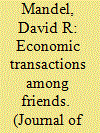

|
|
|
|
|
| Publication |
2006.
|
| Summary/Abstract |
Two experiments tested the idea that economic transactions among friends are influenced by a norm of generosity. Whereas a fairness norm ought to promote agreement in offers between buyers and sellers, a generosity norm should promote altruistic disagreements caused by sellers offering lower prices than buyers-a reversal of the well-known endowment effect. Supporting the present account, in both studies, offers among friends showed a reversal of the endowment effect. Moreover, disagreement in buying and selling offers was stronger among friends than among acquaintances, and (in study 2) the perceived generosity of offers, but not their perceived fairness, mediated this effect. Finally, both studies demonstrated that generosity is asymmetric: whereas selling offers among friends were generous by all comparative standards, buying offers were not.
|
|
|
|
|
|
|
|
|
|
|
|
|
|
|
|
| 5 |
ID:
122481


|
|
|
|
|
| Publication |
2013.
|
| Summary/Abstract |
From September 2012 most home undergraduates at English universities are being charged fees of £9,000 per annum. These are funded by a government loan, which attracts interest from the moment they start their course; after three years their accumulated debt exceeds £30,000. They can also borrow to cover their living costs, on the same terms, so that those studying in London can graduate with a debt of more than £50,000-although those from low-income families can obtain grants and universities are encouraged to provide bursaries and other support to students from underrepresented groups. Graduates start repaying their debts once their annual income exceeds £21,000-at a rate of 9% of the difference between their income and that figure: until the debt is fully repaid it continues to attract interest, by as much as three percentage points above the current inflation rate. Using data from a calculator on a government website, this paper shows that the highest-paid graduates pay back less than those on middle incomes: the 'squeezed middle' pays back more not only than those on low incomes but also the better-paid and those whose incomes increase more rapidly. This has differential effects according to occupation-and sex; and middle-income groups also contribute more to the costs of widening participation programmes, which all universities charging more than £6,000 per annum are required to fund.
|
|
|
|
|
|
|
|
|
|
|
|
|
|
|
|
| 6 |
ID:
179869


|
|
|
|
|
| Summary/Abstract |
American politicians repeatedly and strenuously invoke concerns about fairness when pitching their trade policies to their constituents, unsurprisingly since fairness is one of the most fundamental and universal moral concepts. Yet studies to date on public opinion about trade have not been designed in such a way that they test whether fairness is important, nor whether the mass public applies fairness standards impartially. Drawing on findings in social psychology and behavioral economics, we develop and find evidence for an “asymmetric fairness” argument. In a national survey of Americans, we find strong evidence that fairness, conceived in terms of equality, is crucial for understanding support for potential trade deals and support for renegotiating existing ones. Americans view as most fair and most preferable outcomes in which concessions and benefits are equal across countries, especially when those equal benefits match productivity. However, we find that Americans have an egoistically biased sense of fairness, responding particularly negatively to any outcome that leaves the United States relatively worse off—a sense of injustice that does not extend to the same degree to relative gains for Americans.
|
|
|
|
|
|
|
|
|
|
|
|
|
|
|
|
| 7 |
ID:
135247
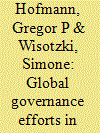

|
|
|
|
|
| Summary/Abstract |
This article focuses on the role of justice claims for issues of global governance. Conflicting justice convictions held by states can become considerable stumbling blocks for multilateral negotiations. Normative claims which call for strengthening individual rights, such as human rights or human security, often collide with statist sovereignty convictions, such as the right of non-intervention, territorial integrity and non-interference. Conflicts between negotiating parties also occur on questions of distribution, recognition and procedural justice. The article argues that such justice conflicts affect the outcome of negotiations. Two recent negotiation processes and governance efforts at the United Nations are examined: the Responsibility to Protect (2005) and the Arms Trade Treaty (2013).
|
|
|
|
|
|
|
|
|
|
|
|
|
|
|
|
| 8 |
ID:
110400
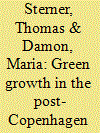

|
|
|
|
|
| Publication |
2011.
|
| Summary/Abstract |
Global climate change stands out from most environmental problems because it will span generations and force us to think in new ways about intergenerational fairness. It involves the delicate problem of complex coordination between countries on a truly global scale. As long as fossil fuels are too cheap, climate change policy will engage all major economies. The costs are high enough to make efficiency a priority, which means striving toward a single market for carbon-plus tackling the thorny issues of fairness.
Hopes for a grand deal were mercilessly shattered at Copenhagen in December 2009 and in other recent UNFCCC meetings, with the result that "green growth" is promoted as an alternative path. Indeed, green growth is clearly the goal, but it is no magic bullet. The world economy will require clear and rather tough policy instruments for growth to be green-and it is naïve to think otherwise. Growth, green or not, will boost demand for energy and coal is normally the cheapest source. The magnitude of the challenge is greater if we also consider the problems related to nuclear (fission) energy and, in some instances, to bioenergy (such as its competition for land that may be essential for the poor). This paper discusses some necessary ingredients for a long-term global climate strategy. As we wait for the final (and maybe elusive) worldwide treaty, we must find a policy that makes sense and is not only compatible with, but facilitates the development of such a treaty.
|
|
|
|
|
|
|
|
|
|
|
|
|
|
|
|
| 9 |
ID:
155695
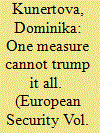

|
|
|
|
|
| Summary/Abstract |
This paper calls for a qualitative turn in discussing NATO burden-sharing. The paper takes issue with the numerical burden-sharing narrative in NATO and identifies its two main problems. Despite being simple, the 2% defence spending pledge lacks other basic attributes of any contributory system: fairness and effectiveness. Drawing from concepts of distributive justice, the paper analyses NATO’s first burden-sharing debates and demonstrates that due to their qualitatively different capabilities, the allies agreed on an egalitarian ability-to-pay distributive justice. Furthermore, it shows that the allies refrained from implementing fairness in terms of a one-size-fits-all formula, since this simple numerical approach could not produce fair and effective burden-sharing at the same time. Rather, they developed a dynamic framework for optimal sharing. These formative burden-sharing debates provide valuable lessons learned for the current build-up of NATO’s posture: less focused on formal sharing, more concerned with strategic outputs.
|
|
|
|
|
|
|
|
|
|
|
|
|
|
|
|
| 10 |
ID:
187856
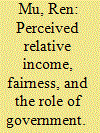

|
|
|
|
|
| Summary/Abstract |
Previous studies have shown that Chinese citizens generally are optimistic about their economic opportunities and tolerant of the high levels of inequality in their society. This paper conducts a random survey experiment to examine whether the established views on fairness and inequality change after the respondents receive the general information on wealth concentration or the customized information on their household income ranking. We find that both types of information lead respondents to view society as less fair than they had initially believed. The information on the wealth concentration also increases public concern about social inequality. Nevertheless, neither information offered to the respondents make them think that government should play a more significant role in reducing inequality. This lack of demand for government intervention may be partially explained by a lower level of trust in the local government induced by the two information treatments.
|
|
|
|
|
|
|
|
|
|
|
|
|
|
|
|
| 11 |
ID:
165909
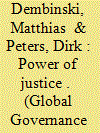

|
|
|
|
|
| Summary/Abstract |
Complaints about “double standards” in global governance are widespread. When governments from the Global South criticize powerful Western states for applying double standards in implementing norms such as international criminal justice, this is usually taken to indicate that they disagree with the substance of these norms. In contrast, this article argues that the criticism can also be understood as expressing dissatisfaction with the procedures for applying those norms. Based on insights from empirical justice research in social psychology, the article highlights the significance of procedural fairness for the legitimacy of institutions and illustrates the importance of concerns about procedural unfairness in recent complaints about the International Criminal Court (ICC) by African governments.
|
|
|
|
|
|
|
|
|
|
|
|
|
|
|
|
| 12 |
ID:
192863
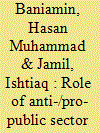

|
|
|
|
|
| Summary/Abstract |
People may evaluate the same level of performance differently because of different biases. The study explores the possible effects of anti-/pro-public-sector bias on perceived performance and fairness in South Asian countries. Using a survey experiment involving a vignette of identical performance (same level of performance) in public and private hospitals, the study finds lower perceived performance in Bangladesh for the public hospitals due to anti-public-sector bias. However, such an effect was not found in other South Asian countries. Rather, the study finds that in India and Sri Lanka, people assessed greater fairness in public hospitals than in private hospitals for the same quality of services. This assessment of fairness may result from pro-public sector bias. Thus, the evaluation of organizational performance can be shaped by sectoral biases, and people may report different levels of performance for identical performance.
|
|
|
|
|
|
|
|
|
|
|
|
|
|
|
|
| 13 |
ID:
178770


|
|
|
|
|
| Summary/Abstract |
This article examines the contradictory outcomes of China’s rural reform since 1978. It traces four periods of rural reform policies through cyclical rounds of policy implementation, structural transformations, and economic, social, and environmental outcomes. The analysis reveals that contradictory outcomes are embedded within conflicting goals framing rural reform policies, specifically goals to modernize China’s rural regions and fair resource allocation among its inhabitants. In addition, the Chinese central government has repeatedly resorted to a top-down, campaign-style approach, creating conflicting objectives between short-term quota fulfillment and sustainable structural adjustment policies. The research suggests that the socio-environmental contradictions emerging from rural transformations in China must be viewed within the global political economic context that favors growth oriented, efficiency-based development strategies.
|
|
|
|
|
|
|
|
|
|
|
|
|
|
|
|
| 14 |
ID:
128966
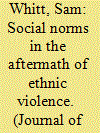

|
|
|
|
|
| Publication |
2014.
|
| Summary/Abstract |
This study considers prospects for the revitalization of social norms after ethnic violence using a behavioral experiment in postwar Bosnia. In the experiment, subjects are asked to distribute a ten-unit monetary sum between two anonymous recipients of random ethnicity. The results indicate a surprisingly high number of egalitarian distributions across ethnicity, which is interpreted as evidence of a norm of fairness. Discriminating behavior in the experiment is explained as a product of ethnic parochialism (rewarding co-ethnics and punishing non-co-ethnics). Overall, the experiment speaks to the resiliency of an important aspect of pro-social behavior after violence-impartiality in the treatment of others.
|
|
|
|
|
|
|
|
|
|
|
|
|
|
|
|
| 15 |
ID:
183693


|
|
|
|
|
| Summary/Abstract |
How do concerns about fairness shape foreign policy preferences? In this article, we show that fairness has two faces—one concerning equity, the other concerning equality—and that taking both into account can shed light on the structure of important foreign policy debates. Fielding an original survey on a national sample of Americans, we show that different types of Americans think about fairness in different ways, and that these fairness concerns shape foreign policy preferences: individuals who emphasize equity are far more sensitive to concerns about burden sharing, are far less likely to support US involvement abroad when other countries aren’t paying their fair share, and often support systematically different foreign policies than individuals who emphasize equality. As long as IR scholars focus only on the equality dimension of fairness, we miss much about how fairness concerns matter in world politics.
|
|
|
|
|
|
|
|
|
|
|
|
|
|
|
|
| 16 |
ID:
098680


|
|
|
|
|
| Publication |
2010.
|
| Summary/Abstract |
A challenge relating to the development of renewable energy in the UK concerns how large companies can foster positive relationships with local communities. The concepts of 'trust' and 'fairness' are central to debates around proposed renewable energy developments, however, these concepts are complex, ambiguous and interrelated. In the UK the provision of community benefits stemming from the development of renewable energy projects remains a voluntary activity. This paper presents the findings of a case study of one wind power development and how community benefits associated with this were perceived by the local community throughout various stages of the case study (notably during planning, construction and operation). The case study highlights the challenging nature of community benefits from wind power developments. Important decisions regarding who the relevant local community is or what form community benefits should take present opportunities for disagreement between conflicting interests. It is argued that institutionalised guidance would serve a number of worthwhile purposes. Firstly, they would provide greater clarity. Secondly, they would give developers greater confidence to discuss the community benefits package in the early planning stages, and thirdly, they would reduce the likelihood of community benefits being perceived as bribes.
|
|
|
|
|
|
|
|
|
|
|
|
|
|
|
|
|
|
|
|
|